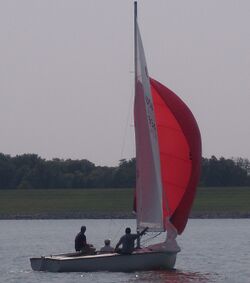Highlander (dinghy)
Topic: Engineering
 From HandWiki - Reading time: 2 min
From HandWiki - Reading time: 2 min
 Class symbol | |
| Development | |
|---|---|
| Designer | Gordon K. (Sandy) Douglass |
| Year | 1949 |
| Design | One-Design |
| Boat | |
| Crew | 3 |
| Draft | 0.67 feet (0.20 m) 5.0 feet (1.5 m) |
| Hull | |
| Type | Monohull |
| Construction | Wood or Fiberglass |
| Hull weight | 830 pounds (380 kg) |
| LOA | 20 feet (6.1 m) |
| LWL | 19.5 feet (5.9 m) |
| Beam | 6.67 feet (2.03 m) |
| Hull appendages | |
| Keel/board type | centerboard |
| Rig | |
| Mast length | 27.08 feet (8.25 m) |
| Sails | |
| Mainsail area | 169.44 square feet (15.741 m2) |
| Jib/genoa area | 228.54 square feet (21.232 m2) |
| Spinnaker area | 300 square feet (28 m2) |
| Upwind sail area | 228.54 square feet (21.232 m2) |
The Highlander is a large (20 foot LOA) high performance one-design racing dinghy, also used for day sailing, popular in the United States. It was designed by Gordon K. (Sandy) Douglass in 1949, to be a more comfortable alternative to the Thistle.[1] The Highlander was the last boat built by the Douglass & McLeod company. It was later built by Customflex Inc., and is currently built by Allen Boat Company. Highlander features an 88-pound centerboard. The Highlander sails with a main, jib and spinnaker. With over 1000 boats built, the Highlander has gained reputation for being stable and secure. There are currently 14 racing fleets of Highlanders located in Indiana, Ohio, Kentucky, North Carolina, Tennessee, and Virginia.[2]
Douglass' Flying Scot is known as the little sister to the Highlander.

External links
References
- ↑ Douglass, Gordon K., "Sixty Years Behind the Mast: The Fox on the Water". McClain Printing Company. ISBN 0-9617502-0-0. pp. 231-34
- ↑ "Fleet Information". The Highlander Class Association Website. http://www.sailhighlander.org/fleet.html.
 |
 KSF
KSF